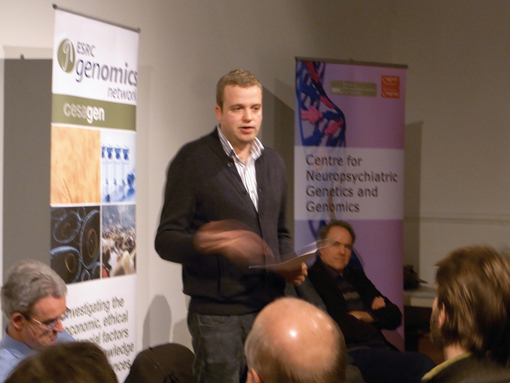Screening Science
Cardiff sciSCREEN (www.cardiffsciscreen.co.uk/) is a cross-disciplinary programme that promotes engagement between science and the academy through audio-visual media. Dr Andrew Bartlett, Cardiff University, discusses how special screenings of new film releases draws on a range of disciplinary perspectives to facilitate debate on contemporary developments in science and the wider social and cultural implications of these advances.
First published in Viewfinder 82.
About the author: Dr Andrew Bartlett is a research assistant working on the Genomics and Psychiatry research project, jointly funded by Cesagen and the Wales Gene Park. His research interests, include the development of ‘big’ biological science projects, the increasing collectivisation and interdisciplinarity of research and the automation of laboratory practice. These issues are considered from the perspective of science as work, and the effects these developments have on both the work environment and experience of scientists and the process of knowledge production. These interests were developed during the production of his PhD thesis, Accomplishing Sequencing the Human Genome, conducted while an ESRC-funded student at Cesagen. Before moving into the sociology of science, Andrew studied biological science (BSc Biology, York, 1999 and MSc Human Genetics, Leeds, 2001). His conversion to social research was cemented by the completion of the Social Science Research Methods MSc in 2003 (dissertation: Defining and Disciplining Bioinformatics).
In March 2011, with a screening and discussion of Never Let Me Go, Cardiff sciSCREEN celebrated its first birthday. Born in early 2010, delivered with the support of the British Science Association, the first events ran as part of Science and Engineering Week. Since that time, with the help of a variety of sponsors and the expertise of speakers from across Cardiff University and beyond, Cardiff sciSCREEN has organised seven events, with 29 different speakers, drawing between 60 and 90 people for each after-film discussion.
Each sciSCREEN event involves a regular, ticketed screening of what is usually a current release film, followed by an hour and a half to two hours discussion. Over a glass of wine, between three to five speakers are invited to connect the issues and themes raised by the film to their areas of expertise, before the discussion opens up with the audience offering their reflections, comments and questions.
Cardiff sciSCREEN is the product of collaboration between the MRC Centre for Neuropsychiatric Genetics and Genomics (CNGG) and the ESRC Centre for Social and Economic Aspects of Genomics (Cesagen). One of the driving forces behind Cardiff sciSCREEN is Jamie Lewis, a Research Associate in Public Engagement at the MRC CNGG. Jamie described the rationale for setting up sciSCREEN; ‘We wanted to engage with publics around issues of psychiatry and genetics and we thought what better way than to use film to provoke interest and ideas. Film gets people talking and we have found the sciSCREEN format an excellent way for academics and publics to come together to discuss developments in science and their social and cultural implications.’

Dr Gary Love, of the School of History, Archaeology, and Religion, speaking at a screening of ‘The King’s Speech’

 Learning on Screen
Learning on Screen
